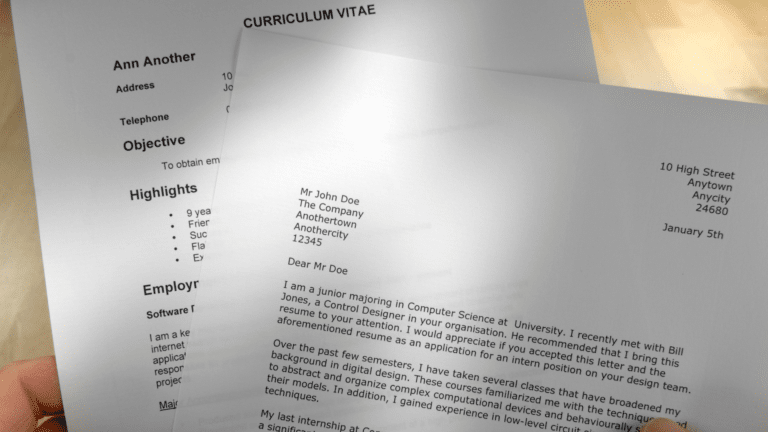Professionalism and agreeableness are two of the most sought-after qualities that interviewers hope to find in potential recruits. They often gauge a job applicant’s capability to establish rapport and thrive in a team setting by asking, ‘How would your boss describe you’?
While recruiters aren’t exactly looking for a new hire who epitomizes a Mr. or Ms. Congeniality persona, they surely prefer hiring someone who is easy to get along with and work with. After all, teamwork and group dynamics are often crucial to ensuring a business’s success.
In this article, we’ve compiled some tips and tricks to help you ace this interview question and convince potential employers that you can be a valuable team member.
Key Takeaways
- Recruiters ask the ‘How would your boss describe you?’ question to determine how well a job applicant can work with a team and take directions from their potential new boss.
- When a recruiter asks you this, you can use performance reviews as a reference to explain how your former employer would describe you.
- You can also mention concrete traits and skills while keeping responses relevant to the job role to describe your previous work relationships with your boss and colleagues.
- When recounting performance reviews from your previous employer, provide a balance of strengths and weaknesses that your colleagues highlighted. Doing so makes your response more grounded, realistic, and relatable.
Why Do Employers Ask the “How Would Your Boss Describe You” Interview Question?
Employers typically ask the ‘How would your boss describe you’ interview question to assess a candidate’s sociability and workmanship and to determine whether a candidate’s personality would blend well with the company’s work culture.
Moreover, inquiring how your boss would describe your work ethic and workplace behavior is one of the typical conversation starters used by recruiters at the beginning of the interview.
Besides that, interviewers may ask you to describe the work dynamics in your last job or cite specific hurdles you and your former teammates had to overcome to achieve a common objective.
Some applicants describe themselves as amiable or easy to work with, but then they turn out to be absolute nightmares in team settings. As such, interviewers conduct a simple test to get an idea of how well or how poorly they can integrate their personalities into team discussions and activities.
For instance, a recruiter might ask how your last employer would describe you to reference your most recent work experience directly. Then, they may contact your character references and compare your answers with their feedback to verify your claim.
How to Answer “How Would Your Boss Describe You” Interview Question
Now that you know why recruiters are interested in knowing how your boss would describe you, here are four effective strategies to help guide you in addressing this query:
#1. Use Performance Reviews
Performance reviews provide quantifiable data and concrete proof of your previous work achievements. You can quote specific phrases or sentences from the feedback given by your former supervisor.
Cite specific ratings given on each criterion that comprises your KPI. For instance, your former manager may have commented on how well you can communicate your ideas during team meetings and brainstorming sessions.
Or, your former colleagues may have commended your initiative to assist other teammates who aren’t so well-versed in the tools you use to fulfill your tasks.
You can also present a letter of recommendation from your former supervisor and elaborate further on your boss’s assessment. Either way, the idea is to present interviewers with evidence that certifies the positive work qualities enumerated in your resume.
#2. State Concrete Traits
Aside from quoting performance reviews from your last job, another strategy worth trying to answer how your boss would describe you is to mention concrete traits you possess.
Note that the characteristics you enumerate should still be related to your work experience or the role you’re applying for. For example, if you are interviewing for a managerial position, you can focus on traits related to leading a team, overseeing a project, or training team members.
Here are two examples of concrete leadership characteristics with sample responses to justify your answer:
- Accountability. During the second quarter of the previous year, my team was tasked with helping generate new leads for the company. Unfortunately, we were unable to meet the target number of leads we were expected to deliver. Instead of blaming my team, I took full responsibility and stressed how I could have trained and assisted my teammates better.
- Effective communication. After being promoted to HR Manager, I dealt with high expectations and intense scrutiny from the higher-ups and my new teammates. To avoid inciting unnecessary misunderstandings, I made sure to give every team member a chance to express their feedback and ideas without being interrupted. I also made sure to take note of their suggestions and seek their objective opinion on any new policies or programs I came up with.
#3. Craft Your Answer as a Story
The question, ‘How would your manager or supervisor describe you?’ is also one of the many tricky interview questions that recruiters use to try and throw you out of your momentum or see how you would react under pressure.
Recruiters use this tactic to segregate candidates with real potential from those who simply copied and pasted generic characteristics from the internet. As such, an interviewer might think you are insincere if you provide quick and generic answers without giving it much thought.
On the other hand, not all employees or applicants have had the best relationships with their former bosses. Some may also have had very little interaction with their supervisors because they worked in a team with over 20 members.
Regardless, it is always ideal to try and go the creative route and answer in a storytelling manner. You don’t have to make up a scenario; rather, just be ready to explain the nature of your professional relations with your former managers.
Specify two to three characteristics or situations wherein your past colleagues praised or positively acknowledged your contributions to the group. Then, elaborate on each trait or example one by one.
If you had very little interaction or did not have a favorable dynamic with your boss, explain the reason why by describing the work environment in your previous job.
You can say that you worked in a fast-paced and highly demanding work environment and that most of the interactions you had with your boss involved small talk and daily task updates.
Or, you can also specify calmly and professionally that while you and your boss didn’t always agree on everything, you both remained respectful of each other’s presence and role in the team.
#4. Make It Relevant
Keep your answers relevant to the position or role you want to get. Indeed, recruiters are eager to know what your former employer would say about you to determine your adaptability in group dynamics.
However, your responses must align perfectly with showcasing why you should be the top choice for the job. Describe feedback from your former boss or colleagues that would underscore your knowledge and expertise in your field.
10 Sample Answers to “How Would Your Boss Describe You” Interview Question
Here are 10 sample answers you can use as a reference to increase your chances of impressing potential employers when answering the query, ‘How would your boss describe you?’
Sample Answer #1: Sales Representative
As a sales representative, I need to be quick to think on my feet and consistently adapt to meet my quotas and KPIs. My former manager would often describe me as consistent, driven, and eager to learn. She would always use my commitment to meeting my weekly performance goals as an example to our newly hired sales agents. My manager would also ask for my assistance from time to time in guiding our recruits. Her feedback and trust in my skills made me feel valued, recognized, and inspired.
Why it works: This response works for roles such as a sales representative because it highlights the importance of positive feedback and receptiveness to improve in a job as demanding as meeting sales quotas.
Sample Answer #2: Publicist
I once worked for a high-profile businessman. When his company faced a significant decline in sales and revenue, he had no choice but to displace a third of his employees. Naturally, my boss received harsh criticism from his former staff and the media. Amid the controversy, my boss approached me and thanked me for my hard work. He added that had it not been for my keen attention to detail, courage, and perseverance, the company’s reputation would’ve been completely damaged, and recovering would have been impossible.
Why it works: One secret to answering how your boss would describe you is to be as concrete as possible. In this example, you can see how providing specific examples helps give more context to the former employer’s feedback, thereby allowing recruiters to picture the relevant role played by the applicant in their last occupation.
Sample Answer #3: Operations Manager
My former colleagues view me as a dependable and approachable leader. My teammates feel secure and comfortable enough to call my attention whenever they experience issues while performing their jobs. When entrusted with a role to lead, I should take charge of bridging any gaps that could cause misunderstandings among the group. In short, I must lead by example.
Why it works: Proving your effectiveness as a manager or a leader is best affirmed from the perspective of the people you worked with and supervised closely.
Sample Answer #4: Teacher
The head teacher at my previous school described me as inspiring, passionate, and patient. He often expressed how he appreciated my dedication to my profession, stating that the job of a teacher is instrumental in shaping our future generation. I am proud to say that even my former co-teachers would always tell me how they loved collaborating on school projects with me.
Why it works: A teaching job leaves a lifelong impact not only on the students but also on the entire school organization. Your colleagues’ feedback on your work ethic speaks volumes about whether you have the capacity to become an effective and dependable educator.
Sample Answer #5: Event Planner
My last employer would describe me as a creative, organized, and practical problem-solver. She was always eager to entrust meticulous clients and large-scale events to me because, according to her, I always think three to five steps ahead and anticipate possible outcomes from a rational perspective.
Why it works: Organizing events means having quick solutions for any unforeseen occurrences during a celebration or gathering. If a colleague or employer entrusts an event planner with high-profile events and demanding clients, it is a testament to their ability to thrive under pressure.
Sample Answer #6: Social Worker
A common piece of feedback I would get from the community leaders I worked with highlights my active listening skills and resilience. They sincerely appreciated my genuine concern for their constituents despite facing communication barriers and struggling to earn their trust.
Why it works: Social workers immerse themselves in different communities and, in most cases, face the harshest realities of life. It takes empathy, openness, and a strong will to fulfill this role. So, garnering favorable responses from the people you regularly interact with as part of your job is an excellent way of showcasing your commitment and sincerity.
Sample Answer #7: Executive Assistant
I have to admit, when I turned in my resignation, my boss jokingly refused to acknowledge it. She described me as an invaluable team member, trustworthy, adaptable, organized, and difficult to replace!
Why it works: The work of an executive assistant can be quite demanding and delicate, especially when the assistants are entrusted with highly confidential information. A single mistake could cause employers to lose their trust and be more critical of the potential candidate for the role. If you are an executive assistant, earning the trust and confidence of your boss is a great way to leave a positive first impression on your next employer.
Sample Answer #8: Operations Liaison
My colleagues would describe me as the idea bank and the center of intelligence for everything related to the company’s products, services, and accounts. They say I can explain the technical details of the company’s services and products in simpler terms. The department heads I worked with also noted how quickly I can adapt to different client demands.
Why it works: Most of the time, interviewers can gauge the authenticity of your character and work ethic just by how your boss would describe you. They seek consistency in your colleagues’ feedback, especially if an integral part of your work experience requires interacting with different departments regularly.
An operations liaison constantly interacts with most, if not all, departments in an organization. Their broad knowledge of the company’s services makes it essential for them to have good work relationships with their coworkers.
Sample Answer #9: Marketing Director
During our last peer performance review, my boss and colleagues described me as communicative, focused, and goal-oriented. They also commended my work ethic. To be more precise, they said that through observing how I worked, they learned several critical pointers on how to set clear boundaries in meeting client expectations and be an efficient member of the team, as well as use the unique skill sets they can bring to the table.
Why it works: Aside from the capacity to think outside the box, a marketing director must also motivate their teammates to strive to be better at their job.
Sample Answer #10: Product Developer
As a product developer, I often feel pressured to exceed expectations and provide original ideas to make the company’s products stand out. During my last evaluation, I was relieved when my boss told me he appreciated how I always welcome our customers’ feedback with an open mind. He added that my hardworking nature and willingness to share my ideas make me a valuable addition to any company or team.
Why it works: The feedback in this example may be simple, but it focuses on the importance of harnessing rapport with your coworkers and your target customers.
4 Pro Tips to Consider When Answering the “How Would Your Boss Describe You” Interview Question
Aside from the sample answers enumerated in the previous section, here are a few more tips from our recruitment experts on how to correctly specify how your boss would describe you:
- Provide background to your answers. Avoid the common interview mistake of providing very little context to your responses. If the recruiter asks the question, ‘How would your boss describe you in three words?’, provide three descriptive words as required and explain why your supervisor would characterize you as such. You can also connect your response with your strengths and weaknesses to exhibit your willingness to learn and improve your skills.
- Connect your answers to your job experience. Focus on describing feedback from your former supervisors based on job experiences related to the position you are applying for. For instance, if you are a candidate for an HR manager position, it may not be ideal to detail how your boss would describe you from job experiences not related to Human Resources.
- Rehearse your answers in advance. Since you have 10 sample answers in this article to use as your reference, you can modify each answer to suit your work experience and feedback from your former manager or boss. Try to practice in front of a mirror to be more conscious of your mannerisms and nonverbal cues.
- Be straightforward and honest but graceful. Exploring your work relationship with your former boss is a type of behavioral interview question. Understandably, not all team dynamics are cohesive or symbiotic, making it difficult for some applicants to answer the question, ‘How would your boss describe you?’
It is always best to exude integrity and grace, even if you do not have a favorable work relationship with your former colleagues. Focus on the specific tasks or challenges that affected your rapport, and then counter it with how you handled the striking differences with your coworkers professionally.
Final Thoughts
Now that you know the best ways to answer the interview question, ‘How would your boss describe you?’, you will surely have better composure while describing your past professional relationships.
Recruiters evaluate your fitness for the role based on your answers and your disposition when recounting how you worked with your colleagues and supervisors.
At best, foster positive and cordial relations with your coworkers and focus on giving your best in every task or project assigned to you. The goal is to earn favorable performance reviews and feedback organically and increase your chances of getting hired!














